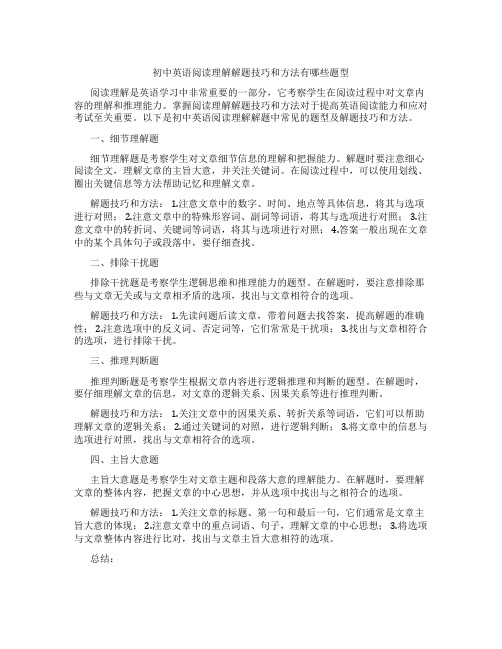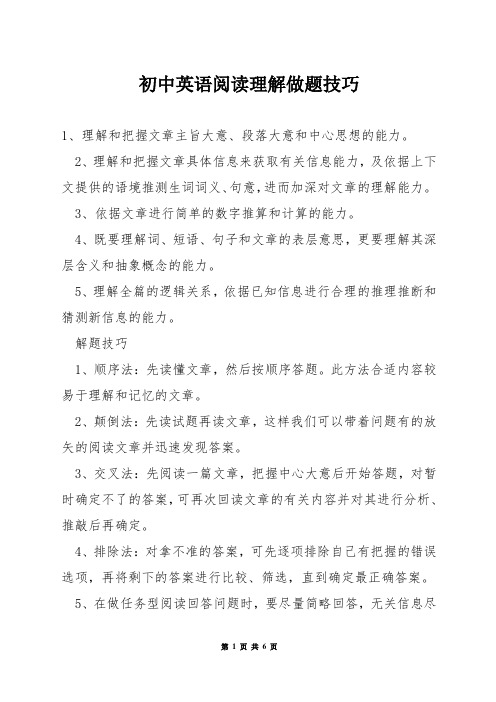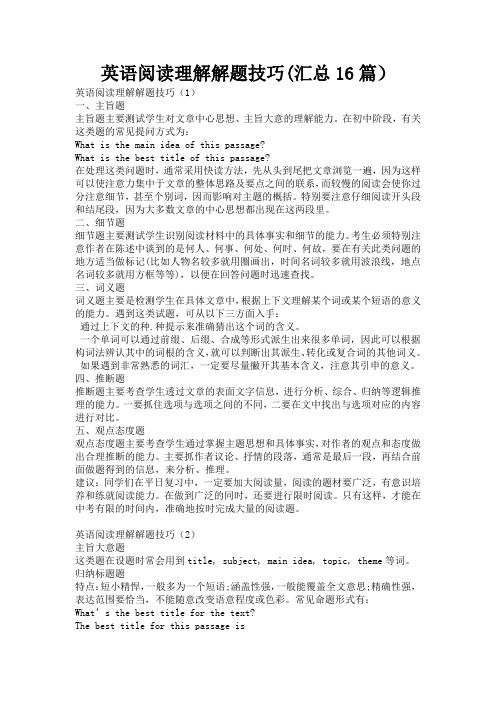初中英语阅读理解解题技巧
初中英语阅读理解的技巧和方法是什么

初中英语阅读理解的技巧和方法是什么每天一篇短文阅读,每周一篇书面表达。
可以阅读一些浅显的英文刊物,能逐步的提高你英语阅读理解的能力。
下面是小编给大家带来的初中英语阅读理解的技巧和方法,欢迎大家阅读参考,我们一起来看看吧!初中英语阅读理解的技巧和方法一、讲究阅读的方法和技巧1.依据主题句定短文的中心:任意一篇文章通常是围绕一个中心展开并且由段落组成的;段落之间有着内在的紧密联系,而表达段落主题的句子叫主题句,通常置于段落的开头,有时在段落末尾和中间;其它的句子是用来说明和阐述主题句的;若把一个个主题句加以整理,你能悟出其中心思想,同时还可以回避、排除个别生词、难句(等困难信号)所带来的干扰,但也有一些文章的中心思想常贯穿在全文中,因而要综观全文,对全文有一个透彻的理解才行。
如:My friend Matt and I arrived at the Activity Centre on Friday evening. The accommodation wasn’t wonderful, but we had everything we needed (beds, blankets, food ), and we were pleased to be out of the city and in the fresh air.On Saturday morning we met the other ten members of our group. Cameron had come along with two friends, Kevin and Simon, while sisters Carole and Lynn had come with Amanda. There were some other members I didn’t know. We had come from different places and none of us knew the area.We knew we were going to spend the weekend outdoors, but none of us was sure exactly how. Half of us spent the morning caving while the others went rock-climbing and then we changed at lunchtime. Matt and I went to the caves (岩洞) first. Climbing out was harder than going in, but after a good deal of pushing,we were out at last. Though we were covered with mud, we were pleased and excited by what we’d done.This passage mainly talks about ______________.A. the writer’s friends at the Activity CenterB. the writer’s experience at the Activity CenterC. outdoor sports at the Activity CenterD. how to go rock-climbing and caving[参考答案B] 上述这段短文的中心是说明“the writer’s experience at the Activity Center.”。
初中英语阅读理解解题技巧和方法有哪些题型

初中英语阅读理解解题技巧和方法有哪些题型阅读理解是英语学习中非常重要的一部分,它考察学生在阅读过程中对文章内容的理解和推理能力。
掌握阅读理解解题技巧和方法对于提高英语阅读能力和应对考试至关重要。
以下是初中英语阅读理解解题中常见的题型及解题技巧和方法。
一、细节理解题细节理解题是考察学生对文章细节信息的理解和把握能力。
解题时要注意细心阅读全文,理解文章的主旨大意,并关注关键词。
在阅读过程中,可以使用划线、圈出关键信息等方法帮助记忆和理解文章。
解题技巧和方法: 1.注意文章中的数字、时间、地点等具体信息,将其与选项进行对照; 2.注意文章中的特殊形容词、副词等词语,将其与选项进行对照; 3.注意文章中的转折词、关键词等词语,将其与选项进行对照; 4.答案一般出现在文章中的某个具体句子或段落中,要仔细查找。
二、排除干扰题排除干扰题是考察学生逻辑思维和推理能力的题型。
在解题时,要注意排除那些与文章无关或与文章相矛盾的选项,找出与文章相符合的选项。
解题技巧和方法: 1.先读问题后读文章,带着问题去找答案,提高解题的准确性; 2.注意选项中的反义词、否定词等,它们常常是干扰项; 3.找出与文章相符合的选项,进行排除干扰。
三、推理判断题推理判断题是考察学生根据文章内容进行逻辑推理和判断的题型。
在解题时,要仔细理解文章的信息,对文章的逻辑关系、因果关系等进行推理判断。
解题技巧和方法: 1.关注文章中的因果关系、转折关系等词语,它们可以帮助理解文章的逻辑关系; 2.通过关键词的对照,进行逻辑判断; 3.将文章中的信息与选项进行对照,找出与文章相符合的选项。
四、主旨大意题主旨大意题是考察学生对文章主题和段落大意的理解能力。
在解题时,要理解文章的整体内容,把握文章的中心思想,并从选项中找出与之相符合的选项。
解题技巧和方法: 1.关注文章的标题、第一句和最后一句,它们通常是文章主旨大意的体现; 2.注意文章中的重点词语、句子,理解文章的中心思想; 3.将选项与文章整体内容进行比对,找出与文章主旨大意相符的选项。
初中英语阅读理解解题技巧方法及答案

初中英语阅读理解解题技巧方法及答案阅读理解是初中英语中的重要部分,对于学生来说,解决阅读理解题是一个挑战。
然而,只要掌握一些解题技巧,就能够更好地应对这一部分的考试。
以下是几种解题方法及例题解答,希望能够对学生们的学习有所帮助。
技巧一:熟悉文章结构在解题之前,首先要通读整篇短文,了解文章的大意和结构。
可以通过阅读文章的开头和结尾段落,抓住文章的主题和观点,并对每个段落的主要内容进行简单的概括。
这有助于我们对文章的理解,并帮助我们更好地回答问题。
技巧二:理解关键词遇到不认识的单词或短语时,不要停下来查字典,可以通过上下文推测出它们的意思。
通常,关键词往往是答案的线索。
例如,如果题目问到“作者为什么认为……”,那么我们可以在文章中寻找与这个问题相关的观点或论述。
技巧三:注意细节解题过程中需要注意文章中的细节信息,尤其是数字、特殊名词、地点等具体描述。
这些细节常常是解答问题的关键。
我们可以通过划线、做笔记等方式来帮助我们记忆和定位重要信息。
在回答问题时,要确保答案与文章中的信息一致。
技巧四:仔细阅读问题在阅读问题时,要仔细分析,确保理解问题的意思。
有时候问题可能会有一些转折或否定的词语,我们需要特别注意这些词语对问题的影响。
此外,还需要注意问题的提问方式,有些问题可能需要我们回答按时间顺序排列的事件,而有些问题可能需要我们对文章的观点进行判断。
下面是一道阅读理解题及解答,以供参考:【例题】(1)What is the most important part of solving a problem? A. Understanding the problem.B. Finding a solution.C. Asking for help.D. Having confidence.(2)When should you think about the different parts of a problem? A. At the beginning.B. Before you start.C. After you start.D. At the end.(3)What can make problems look easier? A. Solving them quickly.B. Breaking them into smaller parts.C. Having a friend to help.D. Not thinking about them.【解答】(1)A (2)B (3)B根据以上解题技巧,我们可以进行如下思路分析:对于第一题,我们可以通过细读文章并理解问题的意思,发现“Understanding the problem.”与问题中的“most important part”相对应,因此选择A. 对于第二题,我们需要注意问题中的时间状语“At the beginning.”,通过理解这个状语,我们可以得出正确答案为A. 对于第三题,我们需要根据文章中的信息“Breaking them into smaller parts.”进行判断,因此选择B.通过以上分析,我们可以发现通过熟悉文章结构,理解关键词,注意细节和仔细阅读问题可以帮助我们更好地解答阅读理解题。
初中英语阅读理解的解题方法和技巧

初中英语阅读理解的解题方法和技巧初中英语阅读理解题是学生在英语研究中常常遇到的题型之一。
下面将介绍一些解题方法和技巧,帮助学生更好地应对这类题目。
1. 仔细阅读题目:在开始阅读理解文章之前,先仔细阅读题目,了解要求回答的问题和关键信息。
这样可以帮助你有一个明确的方向,从而更有针对性地阅读文章。
2. 查找关键词:在阅读文章时,特别要关注和记住关键词。
关键词可能是题目中的关键词,也可能是文章中的关键词。
通过记住和理解这些关键词,可以更好地理解文章的内容和推理出正确的答案。
3. 预测答案:在阅读文章的过程中,尝试根据文章的内容和自己的知识预测答案。
这可以帮助你更好地理解文章,并找到证据支持你的答案。
4. 注意文中细节:在阅读文章时,要特别注意文章中的细节信息。
这些信息可能包括时间、地点、人物、事件等等。
准确理解这些细节信息可以帮助你回答相关的问题。
5. 掌握常见题型:针对阅读理解题目,了解并掌握常见的题型是非常重要的。
比如,主旨题、细节题、推理题等。
对于不同的题型,掌握相应的解题技巧和策略,可以提高解题效率和准确度。
6. 深入理解文章:在解答阅读理解题目时,要深入理解文章的整体意思和作者的观点。
不仅要理解表面的字面意思,还要通过推理和推断,理解作者表达的深层含义。
7. 多做练:提高阅读理解能力需要大量的练。
找一些合适的阅读理解练题,进行反复训练。
通过练,可以锻炼自己的阅读速度和准确性,提高对文章的整体理解能力。
通过使用这些解题方法和技巧,学生们可以更好地应对初中英语阅读理解题,提高解题能力,取得更好的成绩。
初中英语阅读解题的6个技巧是什么

初中英语阅读解题的6个技巧是什么英语阅读是初中英语考试中的重要部分,也是对学生英语能力的考察。
然而,很多学生在解题过程中经常遇到困难,无从下手。
为了帮助同学们提升解题技巧,我总结了以下6个技巧供大家参考。
技巧一:通读全文在解题之前,第一步应该是通读全文。
通读全文能帮助你了解文章的主要内容和结构,以便更好地把握文章的要点。
可以先快速浏览一遍,了解文章的大意和段落分布,然后再稍微仔细阅读一遍,对每个段落进行理解。
通过通读全文,你可以更好地把握文章的脉络,对后面的题目解答会有很大的帮助。
技巧二:理解关键词阅读文章时,遇到生词或者关键词时,一定要注意理解。
有些同学在遇到生词时直接忽略,这是不对的。
要运用词典等工具,查找生词的意思,并做好笔记。
同时,在解题时,关键词的理解也非常重要。
题目中常常会出现一些含糊不清的描述,通过理解关键词,你可以更好地理解题目的意图,从而准确地选出答案。
技巧三:抓住文章中的细节信息阅读理解题中经常会出现一些要求学生找出文章细节的问题。
对于这类题目,你可以使用划线和做笔记的方式,将关键信息标记出来。
在解答问题时,可以直接参考划线的地方,从而减少查找的时间和阅读的负担。
同时,要画出准确的判断,不要过度解读或添加自己的观点。
技巧四:捕捉文章的逻辑关系在英语阅读理解中,文章的句子之间往往存在一定的逻辑关系。
通常有因果关系、转折关系、对比关系等。
通过捕捉这些逻辑关系,你可以更好地理解文章的内在意义,帮助你更准确地回答问题。
解析问题时,可以思考句子之间的关系,帮助你找到正确答案。
技巧五:注意文章的态度和观点阅读文章,要注意作者的态度和观点。
通过抓住作者的态度和观点,你可以更好地理解文章的主旨和意图,并对题目做出正确的判断。
在解题时,要根据文章的陈述加以分析,并结合自己的理解做出正确的选择。
技巧六:多做练习题最后一个技巧是多做练习题。
通过大量的练习,你可以熟悉各种题型的解题思路,掌握解题的技巧和方法。
初中英语阅读理解做题技巧

初中英语阅读理解做题技巧1、理解和把握文章主旨大意、段落大意和中心思想的能力。
2、理解和把握文章具体信息来获取有关信息能力,及依据上下文提供的语境推测生词词义、句意,进而加深对文章的理解能力。
3、依据文章进行简单的数字推算和计算的能力。
4、既要理解词、短语、句子和文章的表层意思,更要理解其深层含义和抽象概念的能力。
5、理解全篇的逻辑关系,依据已知信息进行合理的推理推断和猜测新信息的能力。
解题技巧1、顺序法:先读懂文章,然后按顺序答题。
此方法合适内容较易于理解和记忆的文章。
2、颠倒法:先读试题再读文章,这样我们可以带着问题有的放矢的阅读文章并迅速发现答案。
3、交叉法:先阅读一篇文章,把握中心大意后开始答题,对暂时确定不了的答案,可再次回读文章的有关内容并对其进行分析、推敲后再确定。
4、排除法:对拿不准的答案,可先逐项排除自己有把握的错误选项,再将剩下的答案进行比较、筛选,直到确定最正确答案。
5、在做任务型阅读回答问题时,要尽量简略回答,无关信息尽量删除。
特别疑问句的回答基本是直接信息,在原文中能直接找到答案。
尤其要注意的是要尊重原材料中的信息、观点,并在此基础上答题;不要凭想当然、主观臆断答题,不要钻牛角尖。
2初中阅读理解考查的主要内容。
首先,初中英语试题中的阅读文章题材多样(涉及政治经济、社会文化、风俗习惯、历史地理、科学技术等各个方面),体裁形式丰富(包括记叙文、说明文、议论文、应用文以及新闻报道、广告、通知、操作说明、表格等),这就必须要考生在平常对各方面的知识都有所积存。
其次,阅读理解主要是考查考生综合运用所学语言知识的能力,包括阅读、理解、归纳概括、逻辑推理以及对材料的评估能力等。
在阅读技巧上,考生要注意文章的各别词或句子、文章的某细节或情节、文章的主题或背景知识、文章的结论或结局、文章内涵的寓意等。
最后,从问题设置上可以将问题总结为四种类型:(一)直接题目:这种题目比较简单,只要通读全文,了解文中所表达的重要事实或细节,就可以解答出来,有的甚至可以从文章的原句中直接找到答案。
初中英语阅读理解的技巧和方法

初中英语阅读理解的技巧和方法(经典版)编制人:__________________审核人:__________________审批人:__________________编制单位:__________________编制时间:____年____月____日序言下载提示:该文档是本店铺精心编制而成的,希望大家下载后,能够帮助大家解决实际问题。
文档下载后可定制修改,请根据实际需要进行调整和使用,谢谢!并且,本店铺为大家提供各种类型的经典范文,如演讲致辞、规章制度、策划方案、合同协议、条据文书、心得体会、职业规划、教学资料、作文大全、其他范文等等,想了解不同范文格式和写法,敬请关注!Download tips: This document is carefully compiled by this editor. I hope that after you download it, it can help you solve practical problems. The document can be customized and modified after downloading, please adjust and use it according to actual needs, thank you!Moreover, our store provides various types of classic sample essays for everyone, such as speeches, rules and regulations, planning plans, contract agreements, documentary evidence, insights, career planning, teaching materials, complete essays, and other sample essays. If you want to learn about different sample formats and writing methods, please pay attention!初中英语阅读理解的技巧和方法初中英语阅读理解的技巧和方法2023初中英语阅读理解怎么做?抓住事实和细节事实是作者的思想和观点的有力证据,是作者所写文章的重要依据。
英语阅读理解解题技巧(汇总16篇)

英语阅读理解解题技巧(汇总16篇)英语阅读理解解题技巧(1)一、主旨题主旨题主要测试学生对文章中心思想、主旨大意的理解能力。
在初中阶段,有关这类题的常见提问方式为:What is the main idea of this passage?What is the best title of this passage?在处理这类问题时,通常采用快读方法,先从头到尾把文章浏览一遍,因为这样可以使注意力集中于文章的整体思路及要点之间的联系,而较慢的阅读会使你过分注意细节,甚至个别词,因而影响对主题的概括。
特别要注意仔细阅读开头段和结尾段,因为大多数文章的中心思想都出现在这两段里。
二、细节题细节题主要测试学生识别阅读材料中的具体事实和细节的能力。
考生必须特别注意作者在陈述中谈到的是何人、何事、何处、何时、何故,要在有关此类问题的地方适当做标记(比如人物名较多就用圈画出,时间名词较多就用波浪线,地点名词较多就用方框等等),以便在回答问题时迅速查找。
三、词义题词义题主要是检测学生在具体文章中,根据上下文理解某个词或某个短语的意义的能力。
遇到这类试题,可从以下三方面入手:通过上下文的种.种提示来准确猜出这个词的含义。
一个单词可以通过前缀、后缀、合成等形式派生出来很多单词,因此可以根据构词法辨认其中的词根的含义,就可以判断出其派生、转化或复合词的其他词义。
如果遇到非常熟悉的词汇,一定要尽量撇开其基本含义,注意其引申的意义。
四、推断题推断题主要考查学生透过文章的表面文字信息,进行分析、综合、归纳等逻辑推理的能力。
一要抓住选项与选项之间的不同,二要在文中找出与选项对应的内容进行对比。
五、观点态度题观点态度题主要考查学生通过掌握主题思想和具体事实,对作者的观点和态度做出合理推断的能力。
主要抓作者议论、抒情的段落,通常是最后一段,再结合前面做题得到的信息,来分析、推理。
建议:同学们在平日复习中,一定要加大阅读量,阅读的题材要广泛,有意识培养和练就阅读能力。
- 1、下载文档前请自行甄别文档内容的完整性,平台不提供额外的编辑、内容补充、找答案等附加服务。
- 2、"仅部分预览"的文档,不可在线预览部分如存在完整性等问题,可反馈申请退款(可完整预览的文档不适用该条件!)。
- 3、如文档侵犯您的权益,请联系客服反馈,我们会尽快为您处理(人工客服工作时间:9:00-18:30)。
1. How did Henry find out about the farm? A. He saw it in a newspaper advertisement. B. His best friend told him. C. He wrote to the farmer. D. Maybe he learned it from the radio. 2. Henry came back home several days later because ______________. A. he didn't like the country life at all B. the farmer wasn’t friendly to him C. his holiday was over D. he thought he might have to eat the farmer 3. “…and you are complaining!”, the word “complain” means __________.
4.
进行合理推断。所谓推断,就是根据 阅读材料中所提供的信息,推断出未知 的信息。即把有关的文字作为已知部分, 从中推断出未知部分。需要推断的有关 文字可能是词或句子,也可能是若干句 子,甚至是全文。
其类型主要有以下几种:1)事实推断。这种 推断常常针对某一个或几个具体细节,是比较 简单的推断。进行这种推断,要首先在文章中 找出据以推断的有关文字,然后加以分析,尤 其要悟出字里行间的意思。2)指代推断。确 定指代词的含义和指代对象是阅读理解题常见 的题目。要确定指代词所指代的对象,关键在 于对所在上下文的正确理解。指代名词的指代 词,其单复数形式英语被指代的词一致,因此 数的形式可作为识别指代对象第一个辅助标志。 3)
2. 根据上下文猜测词义。猜测词义也是一种英 语阅读能力。英语阅读理解试题中有不少这样 的题目。任何一个实词,只有在一定的上下文 中才能表示一个确定的词义。上下文的作用就 是帮助确定上下文中的词、短语或句子的意义。 据此,我们可以尽可能地利用上下文来猜测词 义,即从已知推求未知,也就是用我们所熟悉 的词或短语来猜测我们不熟悉的词的词义。
Passage 2
Three travelers, Allan, Carl and Paul were sitting on the chairs in a train station. They were waiting for a train that was very late. To pass the time, they began talking to each other. At first, they talked about the weather and their work. Then Paul said, "Tell me—what would you most like to do if your doctor tell you that you have only three months to live?" The other two men thought about this for a while, then Carl spoke. “Well,” he said, “if I have only three months to live, I’ll take all my money out of the bank and go to foreign countries for holidays with my best friend, Erik. I'd like to travel to the places in the world as many as possible. And I'll stay at the best hotels and then eat the best food. I think I'll have a wonderful time.”
3. 确定细节和事实。在阅读理解题目中,有相当一 部分是考查细节和事实的题目。这类题目相对容易一 些。这些题目有两个共同特点: (1)凡属针对特定细节的考题,其正确答案大都 可以在阅读材料中找到对应的文字部分作为验证。这 一部分可能是一个词或短语,也可能是一个句子或相 关的若干句子,但句式、用词和表达方式不同。 (2)干扰项往往是主体思想与细节混杂,正确答 案细节和非正确答案的细节混杂,甚至真假混杂。因 此,要做好阅读理解中的确定细节和事实的题目,一 要在文章中找出相应的信息点,二要排除干扰项。
Passage 1
Henry was an office worker in a big city. He worked very hard and enjoyed traveling in his holidays. He usually went to the seaside, but one year he saw an advertisement in a newspaper. “Enjoy country life. Spend a few weeks at West Hill Farm. Good food. Fresh air. Horse riding. Walking. Fishing. Cheap and interesting.” “This sounds a good idea,” he thought. “I’ll spend a month at West Hill Farm. I think I can enjoy horse riding, walking and fishing. They’ll make a change from sitting by the seaside and swimming.” He wrote to the farmer. In the letter he said that he would like to spend all of July there. Then on the first of July, he left for West Hill Farm. But four days later, he returned home. “What was wrong with West Hill Farm?” his best friend, Ed, asked him. “Didn’t you enjoy country life?”
推理性题目:这种题目考生往往不能直
接从文中找到答案,而需要根据上下文 及其相互间的关系或对整篇文章进行深 层理解后,才能找到答案。有时甚至还 得考虑作者的主旨、倾向等因素加以推 理,才能获得正确答案。此类题目主要 考查的是句与句之间,段与段之间的逻 辑关系。
概括性题目:要求考生在阅读和理解全文的基 础上对文章做出归纳、概括或评价。此类考查 主旨和大意的题大多数针对段落(或短文)的 主题思想,标题或目的。解这种题目时,不能 只凭文中的只言片语而断章取义,比如涉及文 章的标题、主题、结论、结局等有关问题,都 需要在细读全文的基础上,结合所学语言知识、 背景知识、生活常识、专业知识进行逻辑思维 推理判断,从而获取文章中内含的信息。
一、初中阅读理解考查的主要内容。
题材多样(涉及政治经济、社会文化、风俗习 惯、历史地理、科学技术等各个方面), 体裁形式丰富(包括记叙文、说明文、议论文、 应用文以及新闻报道、广告、通知、操作说 明、表格等) 考查考生综合运用所学语言知识的能力,包 括阅读、理解、归纳概括、逻辑推理以及对 材料的评估能力等。
3)逻辑推断。这类题目往往是要求根据文章所提供 的背景,人物的表情,动作和语言来推断出人物 的态度或感觉。4)对作者的意图和态度的推断。 这一类考题大都要求学生就作者对论述对象持什 么样的态度做出推断,如作者对所陈述的观点是赞 同、反对,还是犹豫不定,对记述或描写的人、 物或事件是赞颂、同情、冷漠,还是厌恶。作者 的这种思想倾向和感情色彩不一定直接表述出来, 而往往隐含在字里行间。因此,进行这种推断时, 我们既要依靠短文的主题思想作为推力的前提, 又要注意作者的措辞,尤其是形容词一类的修饰 语。
二、问题设置上可以分为四种类型
直接题目:这种题目比较简单,只要通读全文,
了解文中所叙述的重要事实或细节,就可以解答出 来,有的甚至可以从文章的原句中直接找到答案。 此类考查事实和细节的题目大多数是针对文章的细 节设计的。 理解性问题:要求对文中个别难词、关键词、词组 或句子做出解释。解答这类题目时需要对有关的上 下文,甚至整篇文章的内容建立准确、立体的理解 才能做出正确答案。此类猜测词义的题目,要求考 生根据上下文确定某一特定的词或短语的准确含义 。
三、阅读理解题的解题技巧。
1.获取段落的主旨和大意。最有效的办法是 找出主题句。一篇文章(或一段文章)通常 都是围绕一个中心意思展开的。而这个中心 意思往往由一个句子来概括。这个能概括文 章或段落中心意思的句子叫做主题句。因此, 理解一个段落或一篇文章的中心意思首先要 学会寻找主题句。
在一个段落中,大部分主题句的位置有两种: 1)主题句在段首。这种情况相当普遍。一般 新闻报道、说明文, 议论文大都采用先总述, 后分述的叙事方法。 2)主题句在段末。用归纳法写文章时,往往 表述细节的句子在前,概述性的句子在后,并 以此结尾。这种位于句末的主题句往往是对前 面细节的总结,归纳或结论。
A.夸奖 B.说三道四 C.抱怨 D.故弄玄虚
4. Which of the following sentences is true? A. Ed could eat a different kind of meat every day. B. Henry thought he could enjoy a change. C. Henry couldn't think of anything else to do, so he went to the farm. D. The farmer died because of the bad meat he ate. 5. Which is the best title for the passage? A. What a beautiful farm! B. Have a good time. C. A short holiday D. Henry and the farmer.
